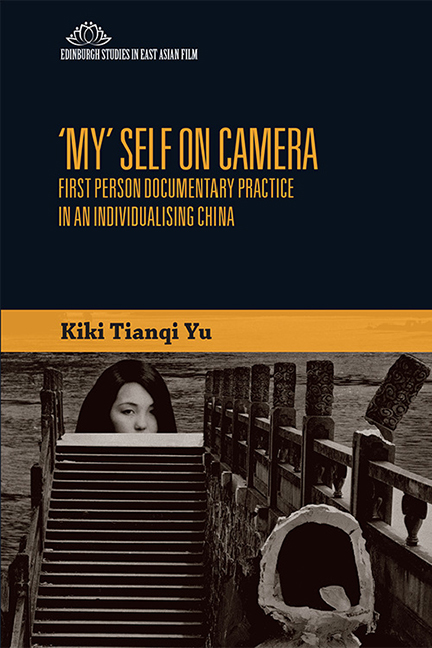Book contents
- Frontmatter
- Contents
- List of Figures
- List of Main Terms with Chinese Translations
- List of Names with Chinese Character Translations
- Acknowledgements
- Dedication
- Introduction: Action, Amateurness and the Changing Sense of the Individual Self
- 1 Female First Person Documentary Practice: Negotiating Gendered Expectations
- 2 Amateurness and an Inward Gaze at Home
- 3 Nostalgia toward Laojia: Old Home as an Imagined Past
- 4 First Person Action Documentary Practice: Longing for a More Politicised Space
- 5 The Problematic Public Self: Ethics, Camera and Language in Contestable Minjian Public Spaces
- 6 Camera Activism: Provocative Documentation, First Person Confrontation and Collective Force
- 7 Whose Self on Camera? Motives, Mistrust, Disputed Authenticities
- 8 From Fragile First Person Documentary Practice to Popular Online First Person Live Streaming Broadcast – Zhibo: Changing Intentions, Changing Individual Selves
- Filmography
- Bibliography
- Index
2 - Amateurness and an Inward Gaze at Home
Published online by Cambridge University Press: 10 November 2020
- Frontmatter
- Contents
- List of Figures
- List of Main Terms with Chinese Translations
- List of Names with Chinese Character Translations
- Acknowledgements
- Dedication
- Introduction: Action, Amateurness and the Changing Sense of the Individual Self
- 1 Female First Person Documentary Practice: Negotiating Gendered Expectations
- 2 Amateurness and an Inward Gaze at Home
- 3 Nostalgia toward Laojia: Old Home as an Imagined Past
- 4 First Person Action Documentary Practice: Longing for a More Politicised Space
- 5 The Problematic Public Self: Ethics, Camera and Language in Contestable Minjian Public Spaces
- 6 Camera Activism: Provocative Documentation, First Person Confrontation and Collective Force
- 7 Whose Self on Camera? Motives, Mistrust, Disputed Authenticities
- 8 From Fragile First Person Documentary Practice to Popular Online First Person Live Streaming Broadcast – Zhibo: Changing Intentions, Changing Individual Selves
- Filmography
- Bibliography
- Index
Summary
Usually the amateur is defined as an immature state of the artist: someone who cannot – or will not – achieve the mastery of a profession. But in the field of photographic practice, it is the amateur, on the contrary, who is the assumption of the professional: for it is he who stands closer to the noeme of Photography.
Roland Barthes (1999: 98–9)The family portrait is a quasi-ritualistic practice producing memories of family gatherings and smiling faces. The process of sitting, chatting, laughing, arguing, fades away with the sound of a shutter clicking. The rows and tears that are part of everyday family life are forgotten or hidden. In Family Phobia (2010), Hu Xinyu, however, offers those tearful real-life dramas in his own extended family through his nearly decade-long first person ‘gazing’ at home, assisted by his amateur DV camera.
The film is compiled from Hu's home videos starting from a family gathering during the 2003 Chinese Spring Festival. As an amateur and independent filmmaker who is passionate about recording life with a DV camera, Hu is conscious of documenting every minute of his family life, but without a clear idea initially of what kind of film he wants to make. The film records the mundane everyday life of Hu's parents, sisters and brother, and nephew and nieces, in a small statesubsidised flat in Xuqing, a third-tier post-industrial city in Shanxi Province, north China.
Hu Xinyu is among the first group of amateur DV filmmakers to emerge in China at the dawn of the twenty-first century. He received no professional training in filmmaking, and works as a music teacher in a provincial college. He was introduced to the field of filmmaking through being an actor in Jia Zhangke’s film Unknown Pleasures (2002), which recruited some non-professional actors. Working with a small crew filming on video, he realised that filmmaking did not require high level qualifications; therefore he bought a DV camera and started filming his close friends and family (author's interview with Hu, 2010).
- Type
- Chapter
- Information
- My Self on CameraFirst Person Documentary Practice in an Individualising China, pp. 61 - 79Publisher: Edinburgh University PressPrint publication year: 2018



